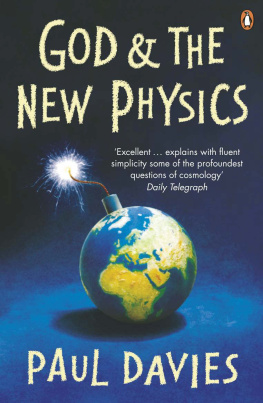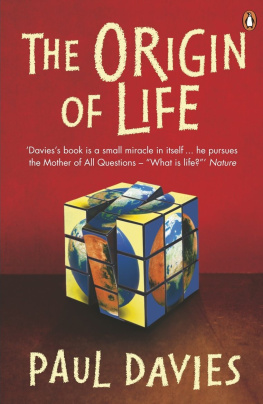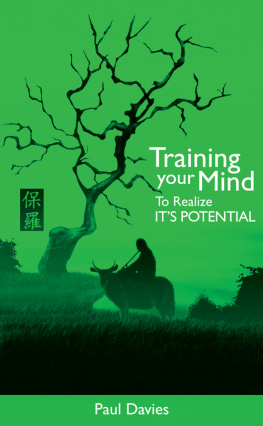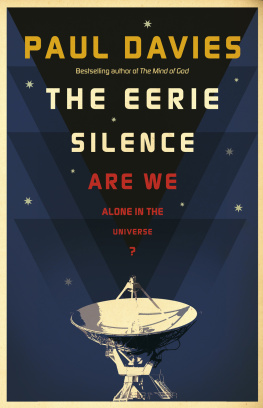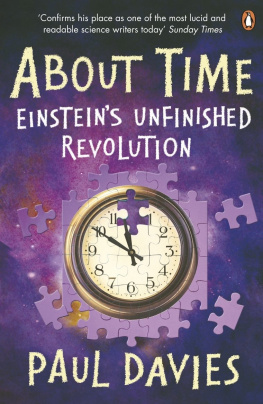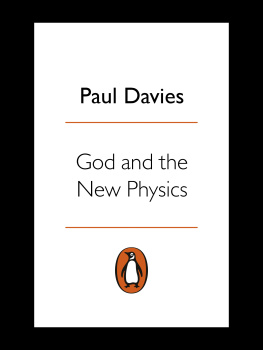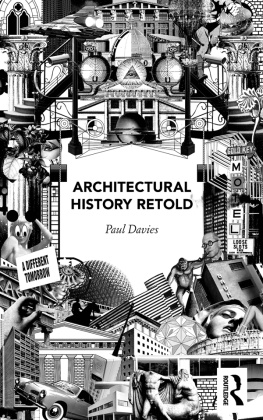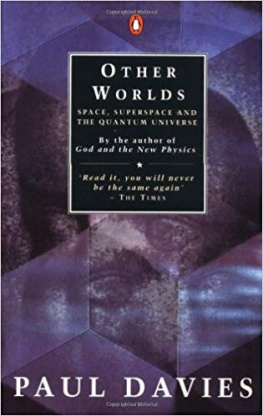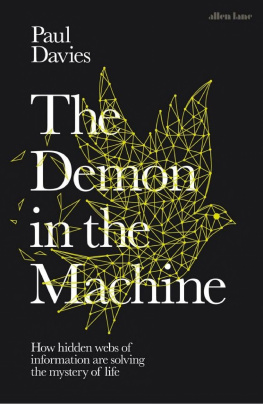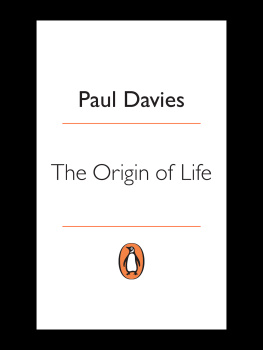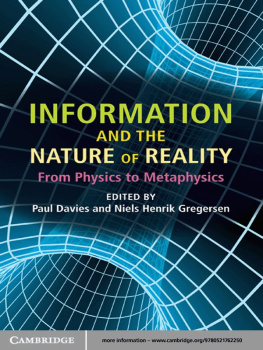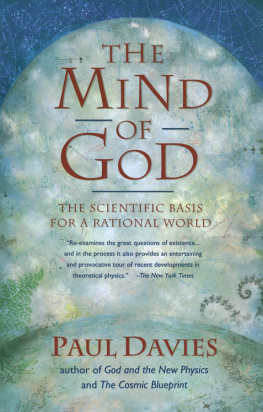Paul Davies - God and the New Physics
Here you can read online Paul Davies - God and the New Physics full text of the book (entire story) in english for free. Download pdf and epub, get meaning, cover and reviews about this ebook. year: 2006, publisher: Penguin Adult, genre: Religion. Description of the work, (preface) as well as reviews are available. Best literature library LitArk.com created for fans of good reading and offers a wide selection of genres:
Romance novel
Science fiction
Adventure
Detective
Science
History
Home and family
Prose
Art
Politics
Computer
Non-fiction
Religion
Business
Children
Humor
Choose a favorite category and find really read worthwhile books. Enjoy immersion in the world of imagination, feel the emotions of the characters or learn something new for yourself, make an fascinating discovery.
- Book:God and the New Physics
- Author:
- Publisher:Penguin Adult
- Genre:
- Year:2006
- Rating:3 / 5
- Favourites:Add to favourites
- Your mark:
- 60
- 1
- 2
- 3
- 4
- 5
God and the New Physics: summary, description and annotation
We offer to read an annotation, description, summary or preface (depends on what the author of the book "God and the New Physics" wrote himself). If you haven't found the necessary information about the book — write in the comments, we will try to find it.
God and the New Physics — read online for free the complete book (whole text) full work
Below is the text of the book, divided by pages. System saving the place of the last page read, allows you to conveniently read the book "God and the New Physics" online for free, without having to search again every time where you left off. Put a bookmark, and you can go to the page where you finished reading at any time.
Font size:
Interval:
Bookmark:
PENGUIN BOOKS
GOD AND THE NEW PHYSICS
Paul Davies is an internationally acclaimed physicist, writer and broadcaster, now based in South Australia. He obtained a Ph.D. from the University of London and has worked at the universities of London, Cambridge, Newcastle upon Tyne and Adelaide. He is currently Professor of Natural Philosophy at the Australian Centre for Astrobiology, Macquarie University, Sydney, and he holds a Visiting Professorship at Imperial College in London. His research interests are in the field of black holes, cosmology and quantum gravity. Professor Davies is the author of some twenty books, including, in Penguin, Superforce, Other Worlds, The Edge of Infinity, The Mind of God, The Cosmic Blueprint, Are We Alone?, About Time and The Fifth Miracle.
He is the recipient of a Glaxo Science Writers' Fellowship, an Advance Australia Award and a Eureka prize for his contributions to Australian science, and in 1995 he won the prestigious Templeton Prize for his work on the deeper meaning of science. The Mind of God won the 1992 Eureka book prize and was also shortlisted for the Rhne-Poulenc Science Book Prize, as was About Time in 1996.
Chapter 1
H. Bondi, Religion is a good thing, Lying Truths (eds. R. Duncan and M. Weston-Smith; Pergamon 1979).
Ibid.
K. Pedlar, Mind over Matter (Thames Methuen 1981), p.11.
H. Morowitz, Rediscovering the mind, The Mind's I (eds. D.R. Hofstadter and D.C. Dennett; Harvester/Basic Books 1981).
Chapter 2
I. Kant, Critique of Pure Reason (ed. J.M.D. Meiklejohn; Dent 1934, 1945; first published 1781).
The main part of Pope Pius XII's address is reprinted in English in Bulletin of the Atomic Scientists 8, pp.1436, 165 (1952).
E. McMullin, How should cosmology relate to theology?, The Sciences and Theology in the Twentieth Century (ed. A.R. Peacocke; Oriel 1981).
Chapter 3
Samuel Clarke developed his version of the cosmological argument in the Boyle lectures delivered in 1704, subsequently published under the title A Demonstration of the Being and Attributes of God. Together with a further series of lectures, given in 1905, the lectures were reprinted as A Discourse Concerning the Being and Attributes of God, the Obligations of Natural Religion, and the Truth and Certainty of the Christian Revelation (John and Paul Knapton; London, 1738, ninth edition).
Aquinas, Summa Theologiae (ed. T. Gilby; Eyre & Spottiswoode 1964).
Clark, op. cit. pp.1213.
D. He, Dialogues Concerning Natural Religion (ed. H.D. Aiken; Hafner 1969; first published 1779). Part IV.
St. Augustine of Hippo, On the beginning of time, The City of God (trans. M. Dods; Hafner 1948).
J.A. Wheeler, Genesis and observership, Foundational Problems in the Special Sciences (eds. R.E. Butts and K.J. Hintikka; Reidel 1977).
Ibid.
J.A. Wheeler, Beyond the black hole, Some Strangeness in the Proportion (ed. H. Woolf; Addison-Wesley 1980). See also Is physics legislated by cosmology, Quantum Gravity: An Oxford Symposium (eds. C.J. Isham, R. Penrose and D.W. Sciama; Oxford: Clarendon Press 1975) and Frontiers of Time (North-Holland 1979) by the same author.
A so-called bubble cosmology' has been proposed by J.R. Gott III in Nature 295, 304 (1982), and described less formally in The Sciences (1982). Similar ideas have been published by Katsuhiko Sato et. al. in Progress in Theoretical Physics (Letters) 65, 1443 (1981).
R. Swinburne, The Existence of God (Oxford: Clarendon Press 1979) p.122.
Chapter 4
Swinburne, op. cit., chapter 7.
Ibid. pp. 1312.
E. W. Barnes, Scientific Theory and Religion (Cambridge University Press 1933) p.595.
P.C.W. Davies, The Physics of Time Asymmetry (Surrey University Press/University of California Press 1974).
S.W. Hawking, Breakdown of predictability in gravitational collapse, Physical Review D 14, 2460 (1976); see also Scientific American 236, 34 (1977).
Ibid.
Chapter 5
A. Koestler, Nothing but?, Lying Truths (eds. R. Duncan and M. Weston-Smith; Pergamon 1979). See also Beyond Reductionism New Perspectives in the Life Sciences (eds. A. Koestler and J.R. Smythies; Hutchinson 1969), and Janus: A Summing Up (Koestler; Vintage 1979).
D. Bohm, Wholeness and the Implicate Order (Routledge & Kegan Paul 1980).
E. Schrdinger, What is Life? (Cambridge University Press 1946) p.77. This book is now reprinted together with Schrdinger's other classic Mind and Matter (1958), under the joint titles by CUP (1967).
Ibid., p.76.
F. Crick, Life Itself: Its Origin and Nature (Macdonald/Simon & Schuster 1982).
E. McMullin, op. cit., p.47.
Chapter 6
New Catholic Encyclopedia (McGraw-Hill 1967) vol. 13, p.460.
R.J. Hirst, The Problems of Perception (Allen & Unwin 1959) p.181. Descartes' paradigm for dualism was set out in his main works Le Discours de la Methode (1637), Meditationes de Prima Philosophia (1641) and Principia Philosophiae (1644). See The Philosophical Works of Descartes (trans. E.S. Haldane and G.R.J. Ross; 2 vols., Cambridge University Press 1967).
G. Ryle, The Concept of Mind (Hutchinson 1949, many reprints).
Ibid., p.20.
New Catholic Encyclopedia, op. cit., p.471.
Ryle, op. cit., p.23.
The Mind's I, p.6.
D.R. Hofstadter, Gdel, Escher, Bach (Basic Books, 1979) p.577.
D.M. MacKay, The Clockwork Image (Inter-Varsity Press, 1974) chapter 9.
J.A. Fodor, The mind-body problem, Scientific American (January 1981).
Chapter 7
T. Reid, Essays on the Intellectual Powers of Man (ed. A.D. Woozley; MIT Press 1969; first published 1785) Essay III, chapter 4.
Ryle, op. cit., p.187.
D. Hume, A Treatise of Human Nature (ed. P.H. Nidditch; Oxford University Press 1978; first published 1739) Book I, Part 4, chapter 6.
J. Locke, Essay Concerning Human Understanding, chapter 27 (ed. A.D. Woozley; Dent 1976; first published 1690).
J.R. Lucas, Minds, machines and Gdel, Minds and Machines (ed. A.R. Anderson; Prentice-Hall 1964) p.57.
A.J. Ayer, The Central Questions of Philosophy (Weidenfeld & Nicolson 1973; Penguin 1977) p.119.
Hofstadter, op. cit., p.697.
Lucas, op. cit.
Hofstadter, op. cit., p.709.
See Where am I?, Brainstorms by D.C. Dennett (Bradford Books 1978).
MacKay, op. cit., p.75.
Chapter 8
D. Bohm, op. cit., p.134.
E. Wigner, Remarks on the mind-body question, The Scientist Speculates (ed. I.J. Good; Heinemann 1962).
B.S. DeWitt, The many-universes interpretation of quantum mechanics, Foundations of Quantum Mechanics (ed. B. d'Espagnat; Academic Press 1971).
Chapter 9
See, for example, McTaggart, fixity and coming true, Time, Reduction and Reality (ed. Richard Healey; Cambridge University Press 1981).
St. Anselm, Proslogion (trans. M.J. Charlesworth; University of Notre Dame Press 1979) chapter XIX. One of the earliest proponents of God's timelessness was A.M.S. Boethius (c. 480524). See The Consolation of Philosophy (ed. W. Anderson; Centaur 1963) section 5.6.
P. Tillich, Systematic Theology (S.C.M. 1978) vol. I, p.305.
K. Barth, Church Dogmatics II (i) (trans. G.W. Bromiley and T.F. Torrance; T. & T. Clark 1956) p.620.
Next pageFont size:
Interval:
Bookmark:
Similar books «God and the New Physics»
Look at similar books to God and the New Physics. We have selected literature similar in name and meaning in the hope of providing readers with more options to find new, interesting, not yet read works.
Discussion, reviews of the book God and the New Physics and just readers' own opinions. Leave your comments, write what you think about the work, its meaning or the main characters. Specify what exactly you liked and what you didn't like, and why you think so.

